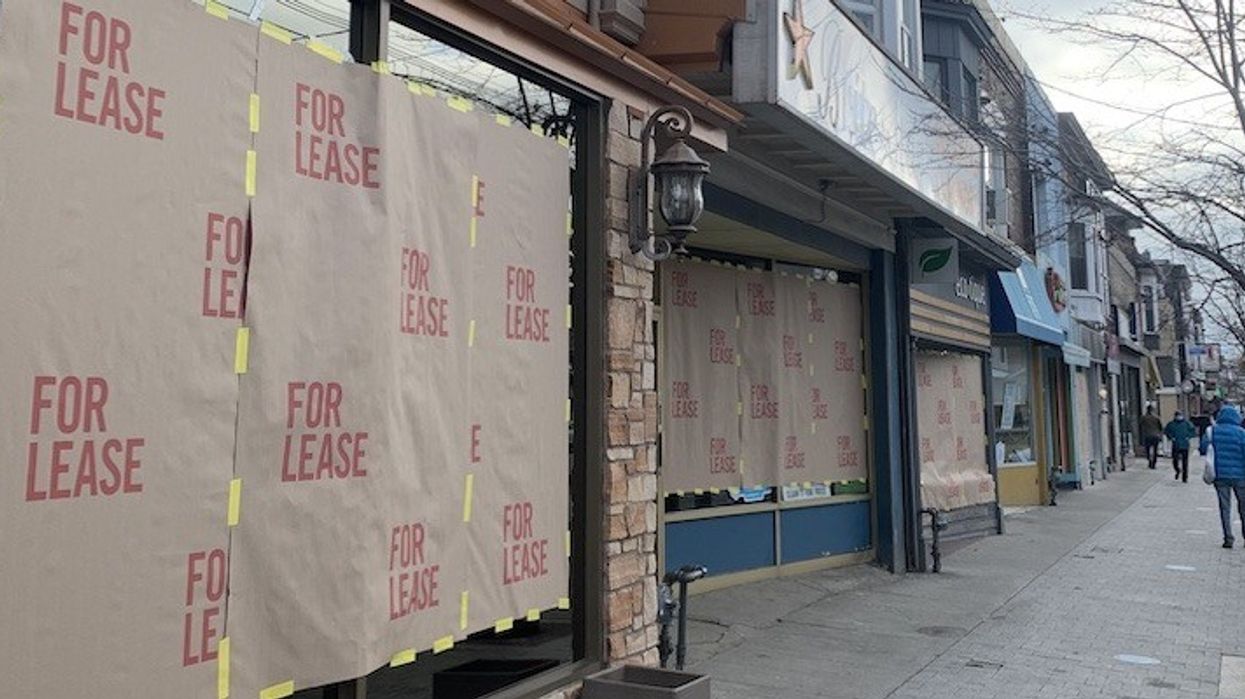Dozens of local businesses in Roncesvalles were plastered with "For Lease" signs this week -- as part of a campaign aimed at reminding the public of the importance of shopping locally.
The impactful campaign, which the Roncesvaless Business Association (BIA) launched Tuesday, also shows the dire reality of what a local neighbourhood could look like without small businesses.
While many Roncesvalles Village storefronts have temporarily closed because of the current lockdown, online purchases and curbside pick-up are still being offered.
The launch of the stunt comes as Premier Doug Ford announced sweeping shutdowns last Friday for Toronto and the neighbouring Peel Region, which went into effect on Monday, November 23 in an effort to curb the rapid spread of COVID-19.
READ: Everything That’s Open and Closed in Toronto During Lockdown
Subsequently, the renewed lockdown measures have forced countless independent retailers, bars, and restaurants in the Toronto region that sell goods deemed non-essential to close their doors yet again, while some big-box store chains like Walmart and Costco can remain open because they sell groceries -- albeit with the new 50% capacity limit.
Now, small businesses are left scrambling to figure out how they will be able to survive the looming holiday season -- which is often crucial for the survival of many businesses. These businesses must now rely on curbside pickup and delivery to make it through the slower winter months.
And with the holiday season around the corner, the BIA is reminding the public that their support of local businesses "is never for lease."
Since Ford's announcement, Dan Kelly, President and CEO of the Canadian Federation of Independent Business (CFIB), has been vocal about the impact the lockdown will have on local small businesses. In a tweet Monday, he criticized an apparent provincial retail inconsistency in regards to The Bay department store at Queen and Yonge Streets in Toronto remaining open because it sells food in its basement.
Kelly tweeted that if The Bay could stay open selling groceries, the province should allow “every shuttered small firm to sell chips and chocolate and declare themselves as an essential retailer.”
Subsequently, the CFIB has called on the Government of Ontario to implement a “Small Business First” COVID-19 Retail Policy to help small retailers safely salvage the remainder of the holiday season.
“We’ve already heard from hundreds of concerned small retailers who feel the lockdown restrictions have created a massive unfair advantage for many big, multi-national corporations,” said Kelly.
“The province needs to fix this imbalance immediately and rely on small businesses as part of the solution to help keep Ontarians from gathering in large groups. The current rules close small bookstores, florists and lighting stores to instore business, but allow customers to line up at Costco and Walmart to buy these same items. If it is dangerous to buy a book at an independent bookseller, why isn’t it dangerous at Costco?”
Through the policy, the CFIB recommends the following additional measures to ensure small retailers can safely serve a limited number of customers. These measures can co-exist with the current rules allowing some critical goods retailers to remain open with 50% capacity.
CFIB recommends that the Government of Ontario:
- Allows all non-essential small retailers to open to in-store sales, but with very limited capacity for customers and public-facing staff
- Limits customers to three per store for a fixed time for personalized shopping
- Limits the store to three public-facing staff to help customers shop as efficiently as possible from a safe distance
- Encourages pre-booking appointments, to avoid long lines outside the store
- Requires all businesses to sign the POST Promise before opening in-store operations
- Still encourages customers to shop by curbside pickup or delivery as preferred means
“A second round of lockdowns is a crushing blow for Ontario’s retail sector,” added Ryan Mallough, CFIB’s director, Ontario.
“Losing the holiday shopping season will mean permanent closure for many small retailers. We believe a Small Business First policy can help them survive, while reducing community spread of COVID-19 if all Ontarians buy-in.”





















